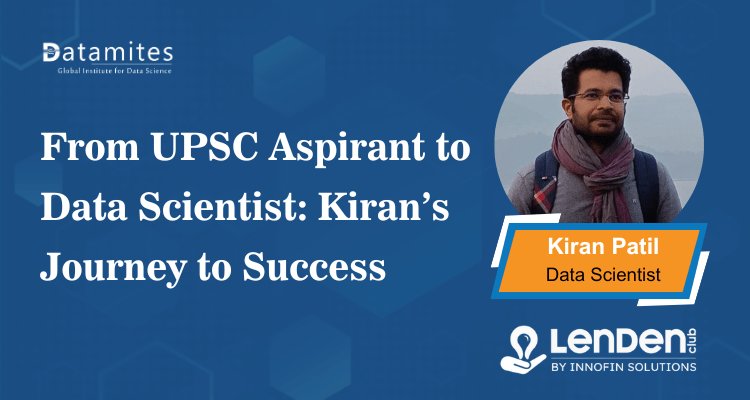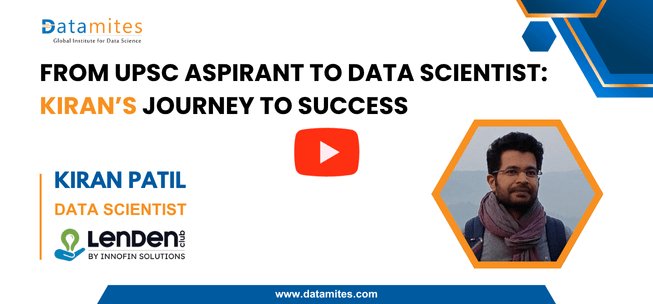From UPSC Aspirant to Data Scientist: Kiran’s Journey to Success
Kiran transitioned from preparing for the UPSC exams to building a successful career as a Data Scientist. His journey highlights determination, upskilling, and the power of career transformation.

In today’s competitive job market, transitioning to a data science career might seem like a steep climb, especially for individuals with non-technical backgrounds or career gaps. But stories like Kiran’s prove that with the right mindset, training, and guidance, the impossible becomes achievable.
From aspiring UPSC candidate to a data scientist, Kiran’s journey is a testament to dedication, continuous learning, and the power of structured mentorship. In this blog, we bring you the highlights from an exclusive Alumni Talk session where DataMites interacted with Kiran to learn about his transition, challenges, and how he overcame them.
Kiran’s Data Science Journey: Charting Success with DataMites
Explore how Kiran leveraged DataMites training to master key skills and secure a rewarding role in data science.
1. Could you please introduce yourself, tell us about your academic background, and explain why you decided to pursue data science?
I belong to the Dhule District of Maharashtra and completed my master’s degree in Pharmacology, so I come from a completely non-technical background. After that, I worked as a Pharmacovigilance Associate. Alongside, I also prepared for the UPSC exams and worked as an Associate Professor in Pharmacology. However, due to the increasing competition and the complex quota system in UPSC, I felt my analytical skills could be better utilized elsewhere. I saw data science as a promising field with bright opportunities.
2. How did you come across DataMites, and why did you choose them?
While researching, I came across Datamites Institute and, after watching their success stories on YouTube and considering their credentials, I decided to join Datamites to start my data science journey. What drew me in was the structured course, support system, and global certifications. Their curriculum felt beginner-friendly yet industry-aligned.
3. Were you able to understand the technical content easily?
At first, I thought Python would be tough since I had no programming background. But the logical structure of Python and the way it was taught made it easier. I got comfortable with it within a few weeks.
4. How long did it take for you to learn Python and core ML?
Roughly 4 to 5 weeks of consistent practice—around 4–5 hours a day. After that, I could build models and understand the math behind them.
5. What projects did you work on during your internship at DataMites?
I worked on projects like:
- Flight price prediction
- Walk/Run classification using LSTM
- Rise image classification
- Creditworthiness prediction
These gave me real exposure to datasets and deployment practices.
6. Did you face challenges working with AI tools like LSTM?
Yes, at times I felt unsure, but with self-study and mentor guidance, I was able to implement LSTM models. Understanding the sequence data logic was key.
7. How was your interview experience post-training?
Most of my interviews began with communication assessments. Only after clearing that, they moved on to technical rounds like Python coding and ML theory.
8. Did your career gap affect job opportunities?
Honestly, it didn’t matter much. What mattered was how clear and confident I was in interviews. Companies appreciated honesty and the skills I brought.
9. Where are you currently placed, and what role are you in?
I’m currently working as a Data Scientist at LenDenClub. It’s a fintech company, and the role allows me to apply machine learning models in real business scenarios. The exposure has been great so far.
10. How important is communication in data science interviews?
Extremely important, especially if you're dealing with international clients. Fluency in English and clarity of thought are sometimes the first filters before technical rounds.
11. What core tools should beginners focus on mastering?
Definitely Python and SQL. These two are non-negotiable in most data roles. Then, focus on pandas, NumPy, and scikit-learn.
12. What’s your view on learning math and statistics?
You need basic stats like Z-score, distribution, mean, standard deviation. Deep calculus or linear algebra is helpful but not mandatory for entry-level roles.
13. How did DataMites support your learning journey?
They provided lifetime learning, weekly bonus sessions, and internship opportunities. Trainers were supportive and always available for queries.
14. How valuable were the mock interviews and resume sessions?
Very valuable. The mock interviews helped me build confidence. Resume reviews were detailed and ensured I presented myself well to recruiters.
15. What certifications did you earn, and did they help?
I earned certifications from IABAC through DataMites. While they added credibility, it was my hands-on projects and interview readiness that made the real difference.
16. Do companies value certification or skills more?
Skills matter more. Certifications get your foot in the door, but interviews focus on how well you can explain, implement, and problem-solve.
17. Did you ever feel demotivated during the learning process?
Yes, especially in the beginning. But seeing real progress in my projects and getting feedback from mentors kept me motivated.
18. How important is self-study alongside structured courses?
It’s crucial. Courses give direction, but deep understanding comes only from self-practice, Kaggle participation, and reading documentation.
19. How do you see AI tools like ChatGPT in your learning process?
Tools like ChatGPT are great for quick help, debugging, or clarifying concepts. They act like 24/7 study partners, but we still need to verify and understand the output.
20. Any final message for aspiring data scientists with non-tech backgrounds?
Don't overthink your background. Focus on skills, be honest in interviews, and stay consistent. Companies today value what you bring now, not what you did five years ago.
Refer these articles:
- Inspiring Data Science Journey of Yash Sahindrakar
- From Physics Graduate to Data Scientist: Gujuri's Inspiring Journey
- Ayush Mehta’s Journey from Engineer to Data Scientist
Learning from Kiran's Achievements in Data Science
Discover how dedication, continuous learning, and practical experience helped Kiran successfully transition into a thriving data science career.
- UPSC Aspirant to Data Scientist: Although Kiran came from a non-technical background, he highlighted that dedication, consistent learning, and logical reasoning enabled him to quickly grasp Python and machine learning concepts.
- Importance of Soft Skills: Especially for roles working with international clients (like those in the US and UK), strong communication skills often act as the first filter before technical assessments.
- Confidence in Key Tools: Kiran is proficient in Python and SQL—essential tools for any data science role—and advises learners to focus on understanding the core logic instead of relying heavily on pre-built libraries.
- Learning Duration: He found that dedicating 4–5 hours daily over 4–5 weeks was enough to develop a solid grasp of Python and machine learning, backed by hands-on projects.
- Real-World Internship Projects: His practical experience includes projects like predicting flight prices, classifying walk/run activities using LSTM, rice grain classification, and creditworthiness prediction.
- Career Gaps Are Not a Barrier: Today’s employers value skills, integrity, and transparency more than academic credentials or employment history gaps. Honesty and a clear purpose are highly appreciated.
- Aligned Training: The training program follows standards set by Nasscom and global audit bodies, with curriculum updates every quarter based on real interview feedback.
- Focus on Essential Math and Stats: Learners should concentrate on key statistical concepts such as distributions and Z-scores, as deep mathematical theory is often abstracted in modern tools.
- Certifications: While certifications can open doors, they do not guarantee a job. Practical skills, hands-on projects, and interview performance hold greater weight.
- Books vs. Practice: Since books can quickly become outdated, active practice, peer reviews, and using AI tools like ChatGPT offer more effective learning experiences.
- Continuous Support: The program provides bonus classes and lifelong learning opportunities to help students stay updated.
- Placement Assistance: Comprehensive support includes resume building, mock interviews, and timely job alerts to help candidates succeed in their job search.
- Final Advice from Kiran: Don’t worry about your background or career gaps. Employers care most about the skills you bring to the table today. Trust your preparation, and success will follow.
Refer these articles:
Kiran’s inspiring journey from a UPSC aspirant to a successful data scientist at LenDenClub shows that determination, continuous learning, and the right guidance can overcome any barrier—be it a career gap or a non-technical background. His journey demonstrates that what truly counts are skill, honesty, and unwavering determination. His advice to aspiring data professionals: embrace learning with honesty, stay committed, and believe in your potential.
If you’re thinking about switching to a career in data science, now is the ideal time to upskill. According to a report by Grand View Research, the global data science platform market, valued at USD 96.25 billion in 2023, is projected to grow at a CAGR of 26.0% from 2024 to 2030, fueled by the explosion of data generated through digital activities. To stay ahead in this rapidly expanding field, it’s crucial to select a training institute that offers practical experience, internships, and strong placement support. Data Science courses in Mumbai, Bangalore, Hyderabad, Chennai, Pune, Delhi, and Ahmedabad, making it easier than ever to begin your journey in this field.
DataMites Institute stands out as a leading training provider specializing in Data Science, AI, Machine Learning, Python Development, and Data Analytics. Ranked among India’s Top 20 AI Institutes by Analytics India Magazine (AIM), DataMites is recognized alongside prestigious institutes like IIT and IIM for delivering top-notch education. Accredited by IABAC and NASSCOM FutureSkills, DataMites provides expert-led courses, real-world projects, and dedicated placement assistance, helping learners like Kiran smoothly transition into successful data science careers.
With offline Data Science training in Mumbai, Pune, Bangalore, Hyderabad, Chennai, Ahmedabad, and Coimbatore, as well as flexible online options, DataMites ensures hands-on learning and industry-relevant skills for all. Whether you’re a fresh graduate, a working professional, or contemplating a career change like Kiran, DataMites offers a structured and effective pathway into Data Science, AI, and Machine Learning.
Kiran’s advice to aspiring data scientists is simple: stay committed, invest consistent time in learning, and always seek to improve. No matter your background or experience level, data science offers immense opportunities for growth and success.

